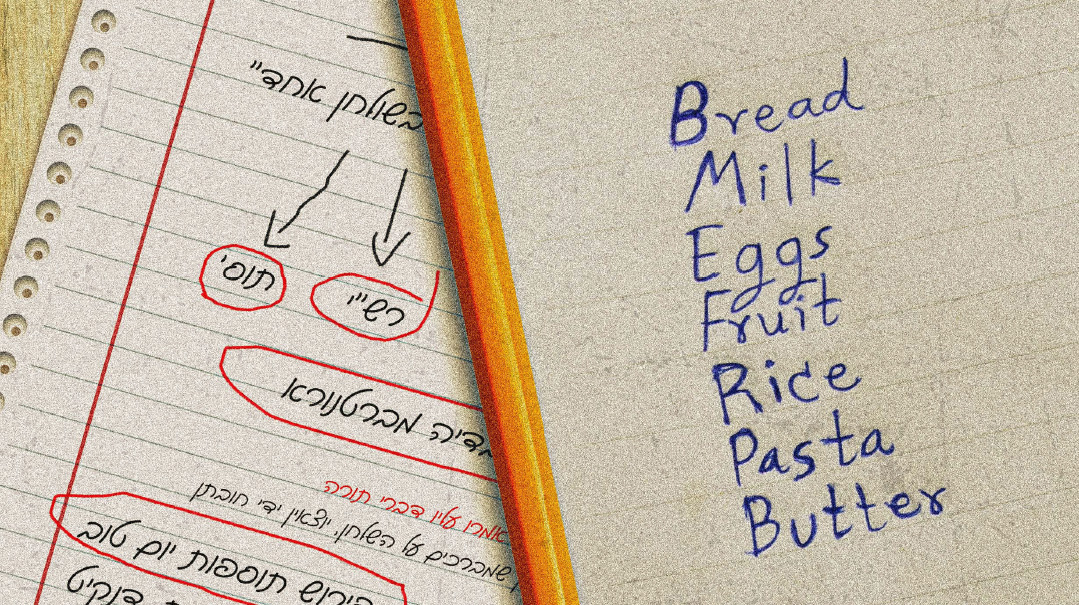Blurred Image
| May 18, 2021The side job was eroding his hard-won self-respect

Yerucham: I’m not in a position to worry about image; I need to provide for my family.
Rabbi Gold: Our students need to be able to respect their rebbeim.
Yerucham
We moved right before Dovy was born. It wasn’t like we really had a choice in the matter. Five kids in our small two-bedroom rental simply wasn’t going to work.
The new apartment was spacious. There were three bedrooms (three!) plus a small office that could double as a fourth one if necessary. The kids had space to play, there were two bathrooms, and it was reasonably priced for the size. Miri, my wife, was delighted.
And I was... frankly, I was terrified.
We’d barely been scraping by through the month until that point. And while the rent was definitely on the lower end for a three-bedroom apartment, it was still significantly higher than what we’d been paying up until then.
How on earth were we going to pay the difference?
Miri didn’t share my concerns, or maybe she was just preoccupied. With the baby on the way, she was determined to get the house organized as quickly as possible. She chatted to me about the space, the closets, the huge pantry, the space. I listened and nodded and tried to smile as the thought buzzed, relentless, through my mind: But the rent. The rent.
Yes, we had a plan. Sort of. We would cut corners here and there, tighten our belts. The school would give a Pesach bonus and Miri’s grandparents usually came through with generous baby gifts. But we already lived frugally, and the extra cash wouldn’t last long.
“Maybe I should look for a different job,” I said to Miri one evening, in desperation.
She turned to stare at me, even while she continued folding the towels.
“Leave your job? But I thought you loved your job.”
“I did. I do.” I’d been teaching fifth grade since leaving kollel. I couldn’t imagine leaving the yeshivah to work in some stuffy office. And where would I even get another job offer? I had zero qualifications, zero experience aside from my teaching job. “It’s just— I keep on crunching the numbers, and I don’t see how this is going to work. We need to pay the bills.”
Miri was quiet. I felt a pang; I hadn’t wanted to put this burden on her, too. She did so much, the house, the kids, a part-time job...
“You’re doing everything you can, don’t worry,” I told her quickly. “This is for me... I’m just figuring out our options.” I thought a moment. “What if… if I took on something extra in the evenings? Like tutoring? Maybe I could get some students, earn some extra income that way...”
She nodded slowly. “That’s a good idea.”
I put out some feelers for private students, but nothing seemed to come of it. “It’s just hishtadlus,” I told Miri, although I was really talking to myself. “When something’s meant to come our way, it will, right?”
“Right,” she said, shifting a little. Was that discomfort in her eyes? Or was she nervous about our finances?
“Miri, don’t worry, it will be okay, b’ezras Hashem. With the rent, and everything. Really.”
She smiled, but the smile didn’t reach her eyes. “I know, I know. I’m not worried.”
When my brother-in-law Chaim called the next day, I realized what Miri had been nervous about.
“Yerucham, listen, I hear you’re looking for an evening job,” he said, cutting to the chase. Chaim’s not a man of small talk and casual conversation. I guess you can’t be one when you run a successful chain of grocery stores. “I have something available in one of my stores, very local, right around the corner from you. It’s evening hours, generous compensation, I’ll make it worthwhile for you. I was going to advertise the position, but you’re family, I’m giving you first grabs. Are you interested?”
A grocery store? I felt my cheeks heat up. I was a kollel yungerman, a rebbi… I wasn’t a cashier or a deliveryman. I didn’t stock shelves or organize warehouses. I barely knew how to scan a barcode.
But this was a job offer… and the salary Chaim was offering was nothing to sneeze at, either.
“How did you know I was looking for something?” I asked, stalling for time, but I already knew the answer. No wonder Miri had looked worried last night. Why had she asked her brother to give me a job? Did she think we were that desperate?
Well, maybe we kind of were. And Miri knew it too. I hadn’t exactly been hiding that.
I took a deep breath and pushed my discomfort aside. “Tell me more,” I said.
It was hard to get used to. The timing, the late nights, the job. Standing at the register, scanning barcodes, bagging items, making small talk with customers. Taking payments, fixing the credit card machine glitches, making notes for the morning manager that we were out of flavored breadcrumbs and jalapeño chips.
But at the end of the month, I was bringing home two pay checks. Two! They covered the rent and the bills and the groceries. Finally, we could breathe again.
Meanwhile, Miri was recovering from the birth, Dovy did the newborn thing, the kids got used to their new space and started complaining again, and I juggled teaching, preparation, the grocery, the shopping, and helping Miri out with the kids. It was hectic, it was blessed, it was routine.
And then Rabbi Gold, the principal of the yeshivah, asked me to meet with him.
It’s always a little scary, being called in to a meeting with your boss. I wondered what Rabbi Gold wanted. The year was drawing to an end, and my class were doing fairly well, all things considered. Was it about the Kramer boy, who’d been acting out recently? Or something to do with next year? Maybe I was behind with some paperwork? These things were hard to keep track of, especially with everything that was going on at home.
“How are things going, Reb Yerucham?” Rabbi Gold sat at his spotless mahogany desk, palms down on the smooth surface. “In school, at home… it’s not easy with a new baby. I appreciate your devotion to your students, that you’ve been continuing to give us your all.”
This was it? The grand meeting was just to catch up and receive a little validation? I breathed a little easier.
“Baruch Hashem, busy, we’re very grateful.”
“Yes.” Rabbi Gold leaned back in his chair, letting his eyes stray to the window, then looked back at me. “Look, Reb Yerucham, I’ve heard that you have epes an evening job? Something in a store?”
I blinked. Where did that come from?
“Uh, yes, I do,” I said, wondering if I was expected to tell him more details.
Surely he didn’t have a problem with a rebbi having a side job? Did he think my classes would suffer, that I wasn’t preparing the lessons as well or grading tests on time? Well, if that was the problem, I could assure him that nothing was suffering as a result of my second job — except for my sleep. I worked through recess, through lunch period, through my break in the grocery — not wasting a second. My classes were fully prepared, and the homework—
“…parents have expressed their concern,” Rabbi Gold was saying. My thoughts raced. The parents were involved? “They feel, and rightly so, that it doesn’t pas for a rebbi to be working in such a capacity. It doesn’t present the right image for someone who teaches Torah. Do you hear what I’m saying, Reb Yerucham?”
The right image?
My head was spinning.
“I — I’m not sure,” I stammered. “I mean, to be honest, I simply need a second job to… make ends meet.” I felt my face burn. This wasn’t just uncomfortable; it was downright humiliating. Did I have to defend myself for trying to support my family? This didn’t make any sense. “Is — is there a problem with that?”
Rabbi Gold looked at me sympathetically. “I hear you, Reb Yerucham, I really do.” He cleared his throat. “However, from the yeshivah’s point of view, it’s not so simple. Our students are young, their thinking is still very ‘black and white,’ you know? They see a rebbi who they’re supposed to be mechabed, we spend so much time talking about kavod rabbanim and kavod haTorah, and then they see that rebbi behind the till in a grocery — it’s confusing for them.”
Confusing? I thought of the students who’d encountered me at Chaim’s store. Wide eyes, staring, a few hushed giggles. But then they’d gotten used to it. Some of them even greeted me each time they came to the store: “Hi, Rebbi!”
“Maybe it can teach them a message, to respect everyone they encounter, not just if they’re in a position in school. Shouldn’t they show respect to the store cashier, anyway?” I said, a little weakly. But really, I wanted to ask, what’s our chinuch worth if the students’ respect is based on such superficial things like what the rebbi does in the evenings?
“Of course, we need to inculcate our talmidim with derech eretz, no matter the situation.” Rabbi Gold said smoothly. “But we still need our rebbeim to present with dignity, whether in school or not. We once had a rebbi, years ago — he was a baseball fan, he used to take his kids to games on Sundays, he’d wear a T-shirt, you know — and we asked him not to. It just didn’t give the right message to the boys. A rebbi has a responsibility, 24/7, to uphold a bekavodige image. You understand me, right?”
I understood him, and I wasn’t sure what to feel first — mortified or panicked. He couldn’t be asking me not to…
“I’m sorry, Reb Yerucham, to put you in a difficult position,” Rabbi Gold said, putting his hands together as if to say, case is closed. “But I’m going to have to ask you to leave the job in the grocery. As a rebbi in our yeshivah, the two just don’t work together.”
If I could tell Rabbi Gold one thing, it would be: There’s nothing undignified about earning a living, and we should be teaching our students that — instead of taking away parnassah from a family desperately struggling.
Rabbi Gold
A good rebbi needs to be many things.
Erlich. Knowledgeable. Warm. Dynamic. Confident.
He needs to have the sensitivity and wisdom to see what’s behind a child’s behavior, see the child’s needs. He needs to be able to multitask, focus on the class as a whole while never losing sight of each individual. He needs to be both firm and flexible, both strong and gentle.
It’s not an easy job.
But the satisfaction of teaching — when it goes well — is unlike anything else in the world.
That’s why I invest so much time into training my staff. Each rebbi deserves to have the tools and guidance he needs, in order to grow in his position. To maintain — or improve — classroom discipline. To master the art of preparing a captivating lesson, to learn to differentiate resources and meet the needs of so many different children at once… It’s a lot to juggle at first, but usually I see how each rebbi grows into his role, finds his own particular style, and most importantly — reaches the hearts of his students, in his own unique way.
Some, of course, have it easier than others. They’re the rebbeim with the natural charisma and dynamism. They tell stories like Shmuel Kunda and speak the kids’ language. Sometimes they struggle with the more tedious tasks like structuring lessons, grading assignments, and creating multiple differentiated versions of tests, but eventually, they get the hang of it, and my input is rarely needed after that.
There are others, though, who struggle in the classroom. They’re the ones who have the paperwork down pat. Lessons painstakingly prepared, down to the visual, audio, kinaesthetic variation of activity to accommodate every learning style. They can recite their lessons by heart, have classroom rules printed on a neat paper tacked on the wall, and have memorized every boy’s name the night before school starts.
But in the classroom, they struggle. Privately, I call this category the theoretical teacher. Their lessons are perfect — in theory. In practice, however, things aren’t so simple. These teachers often lack the natural discipline factor. They rely on their rules and procedures and often stumble in the gray areas that call for quick thinking: Should I allow two boys out of class at the same time? What do I do if I call on a boy to read, and he refuses? How do you handle the kid who just sits and unabashedly noshes on Bissli in class?
Yerucham Lieber was in the latter group. He joined the yeshivah fresh out of kollel, young, eager, and very sincere. A sweet young avreich who genuinely loved Torah, loved to teach, and loved the students — until he tried teaching them.
The first year was a difficult one, but he stuck it out. We worked through the challenges together, and slowly the stream of boys being sent to my office dwindled. By the time Pesach rolled around, I could walk past the fifth-grade classroom without being assaulted by mayhem from behind the door.
Eventually, Rabbi Lieber found his stride, as most rebbis do, if they stick with it. A few years down the line, he was a solid, if not superstar, rebbi in the school. His lessons were still meticulously prepared, but now he could also handle the ups and downs of fifth-grade teaching. The talmidim liked him, they learned well, he was a real talmid chacham who modeled a love of learning… In my book he was a success.
I still glanced into his classroom every so often and helped him out with the occasional discipline issue, but overall, things were going well, and I felt free to focus my attention on the new second-grade rebbi whose classroom management style resembled that of a drill sergeant, and the secular studies teacher in the seventh grade who walked out of most lessons in despair a few minutes after they began.
The first hints of a problem were so subtle, I had trouble pinpointing when they even first appeared. Rabbi Lieber’s classroom was just a little rowdier than usual, a few complaints about boys acting up. Two fifth-graders sent to warm the bench outside my office, twice in one week. A conversation overheard between two of the younger students: And it really was him, Rabbi Lieber from the fifth grade, and he looked so different without his jacket!
At first, I didn’t put too much thought into it. There were other things on my mind: the rebbeim’s overdue salaries, the substitute in the sixth grade, Pedro the janitor refusing to clean the lunchroom — again —after yet another forbidden food fight. (Who’d been on duty in the lunchroom? Where was that paper with the rotation list?) My concerns about the fifth grade were quickly overshadowed by all the other mini crises I had popping up daily.
Until the parents started calling.
“Rabbi Gold, this is Mrs. Fromowitz. Yossi and Benjy’s mother.”
I leaned all the way back in my chair. “Yossi and Benjy, gevaldig, wonderful students, both of them.”
“Yes, thank you, baruch Hashem.” She sounded terse, harried. “I’m calling about Yossi’s rebbi. Rabbi Lieber, in the fifth grade?”
I shot upright. “Yes?”
“I was a little surprised when I saw him the other night, you know, working at the store,” Mrs. Fromowitz said. “I mean, it’s not what you expect a yeshivah rebbi to be doing in the evenings. And my boys were there, and they couldn’t get over it. Benjy kept saying, but rebbis are meant to learn Torah, and Yossi just stared. Something felt so wrong.”
It was a good thing Mrs. Fromowitz hadn’t come to see me in person about this, because I was flabbergasted. A store? What kind of store? Yerucham Lieber? But why? What was he doing there?
And then came a sudden understanding: So that was why.
The undercurrent of mockery in the classroom, in the hallways — the boys had gotten wind of their rebbi’s new side job. Maybe some of them had even seen him there. Knowing what boys are like, I was ready to bet that some of them were purposely frequenting the store, getting a kick out of seeing their rebbi in a different light.
Mrs. Fromowitz was right. It wasn’t okay.
“I hear you, Mrs. Fromowitz, and thank you for bringing this up,” I said carefully, wondering if there was a way to get some more details. (Where did he work? Since when? What was the job, exactly?) “Is there anything else you’d like to mention?”
She sounded miffed. “Will something be done about this… situation?” Her voice sharpened a little. “I’m not an expert or anything, but I know my sons, and I feel like they’re losing respect for the rebbi — and maybe even for the rebbeim overall. We spend so much time trying to teach them to respect the people who teach them Torah, and then they meet their own rebbi in the grocery, ringing up purchases in his shirtsleeves… I just don’t think it’s right.”
Bingo.
“Mrs. Fromowitz, you’re raising a very important point, and I can assure you that I’m looking into it,” I told her.
Then I hung up the phone, grabbed a red pen, and inserted an urgent Lieber — grocery above the first item on my to-do list.
By the end of the morning, I knew everything I needed to know.
By the end of the week, I’d received three more phone calls from parents.
And by the time I finished calming down each one, trying to smooth things over and explain why our yeshivah was hiring store workers as rebbeim, I was finished, too.
This wasn’t going to work.
It wasn’t just about the yeshivah, our policy, whether we could accept the fact that one of our rebbeim was moonlighting as a cashier in a grocery. It wasn’t just the image, the discipline factor, the respect that the kids were losing for the person they were most expected to respect.
It was the parents. The other rebbeim. And then — I should’ve known it was coming — it was the board, as well.
“Four words,” Yoni Feldman, a longstanding board member who had a son in the fifth-grade, said tersely when the subject was raised at a meeting. “It. Has. To. Stop.”
I looked around at the nodding heads, and felt my stomach clench in pity for the oblivious Rabbi Lieber. These men were all successful businessmen; what did they know of a desperate struggle for parnassah, of needing to take on extra jobs in the evening? Yerucham Lieber wasn’t doing this for fun.
But they were right. It wasn’t working, and I had to be the one to do something about it.
Iprocrastinated for a few days. What was I supposed to say? I’m sorry but your income is about to be slashed in half? Leave the grocery or leave the school?
What do you tell someone when you need to give them an impossible choice?
Finally, I poured myself a cup of extra-strong coffee, took a deep breath, and invited Rabbi Lieber in for a meeting.
We made small talk for a few minutes.
“Look, Reb Yerucham,” I said finally. “I’ve heard that you’ve taken on an evening job, something like that? In a grocery store?”
“Yes,” he said slowly, eyebrows knitting. I could almost hear him thinking, So what?
“Some of the parents have called me, expressed their concern,” I said, watching his eyes widen a little in surprise and hurt. I felt sorry for him. But what choice did we have? “They feel that it’s not proper for a rebbi to be working such a job. It doesn’t present the right image for someone who teaches Torah. Do you hear what I’m saying?”
Rabbi Lieber grasped the armrests of his chair, stammering a little. “I – I’m not sure… To be honest, I simply need a second job. I need to make ends meet.” He sounded defensive, hurt — and scared.
I hated to do this to him.
“I hear you. I really do.” I meant it, and I hoped he believed me. “From the yeshivah’s point of view, though, it’s not so simple. Our students are young, they think in very black and white terms, you know? We work so hard to teach them about kavod rabbanim, kavod haTorah, and then they see their rebbi behind the register in a grocery — they’re confused.”
“Maybe we should be teaching them to respect everyone they encounter,” Rabbi Lieber said. “Shouldn’t they respect the cashier in the grocery, as well? So what if he does or doesn’t have a position in the school?”
Of course we should be teaching that. But it wasn’t the point.
“A rebbi has a responsibility,” I tried to explain. “We have to present a bekavodige image. Imagine I was, I don’t know, a waiter at a restaurant in the evenings.” I gave a small smile, trying to soften what I was saying. “There’s nothing wrong with being a waiter. And of course our students should learn to say please and thank you and show respect to the person bringing them their food. But it’s a different kind of respect to what they have — what they should have, what they need to have — for a rebbi or principal. Do you hear what I’m saying?”
Rabbi Lieber shrugged, nodded, and then made a helpless hand gesture. “Yes, maskim, I hear that. But we need the extra income. I’m not sure what I can do about it.”
A vision of the board floated before my eyes, and I willed myself to say the next few words. “I’m sorry to put you in this difficult position, Reb Yerucham. But I’m going to have to ask you to leave the job at the grocery.”
If I could tell Yerucham one thing, it would be: You can’t maintain classroom discipline or kavod haTorah with an evening job that makes your students lose their respect for you.
(Originally featured in Mishpacha, Issue 861)
Oops! We could not locate your form.












